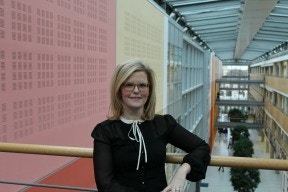Industry support
We are proud of the links we have with professionals in the PR industry and from a broad range of other sectors and organisations, who we work closely with: |
| Visit One Black Bear |
 |
| Visit Spottydog Communications |
 |
| See our Campaigns page to find out more about Permission To Smile |
Student insights
Our students are our best ambassadors so here's a few comments from past and present PR specialists at Birmingham City University School of Media:BA (Hons) Media and Communication (Public Relations)
Hear from the two winners B-Hive 2017 - both PR specialists at BCU School of Media, and both recommending it to other keen students who want to get on in the industry:
___________
Professional courses
CIPR Certificate
Vinny Bolina
Area Communications Manager at West Midlands Crown Prosecution Service
As a career civil servant, I thought I had the knowledge and skills to do my job, but the field of communication is constantly changing and evolving, and I realised that if I did not embrace these changes then I would be doing a disservice to my employer, my stakeholders as well as myself.
As a career civil servant, I thought I had the knowledge and skills to do my job, but the field of communication is constantly changing and evolving, and I realised that if I did not embrace these changes then I would be doing a disservice to my employer, my stakeholders as well as myself.
Every year, each member of staff within the Crown Prosecution Service (CPS) is allocated an individual training allowance from which they can select a training course which will not only improve their skills, but also maintain a professional standard which will enable them to meet the challenges of the future.
As someone who works in communications, there were many training courses available to me, but being a member of the Chartered Institute of Public Relations (CPIR) and someone who was completing their Continuous Development Programme, I spoke to my manager and we both agreed that the CIPR Advance Certificate would be the most appropriate course for me to complete.
Being a mature student, plus doing a demanding full time job, it was a bit daunting going back to university but my fears evaporated on the first day when I met my fellow students and the staff at Birmingham City University who could not do enough for us.
The course itself was well pitched and delivered at a pace which was easy to follow and understand. This was helped by having a team of lectures who not only possessed the PR knowledge, but as they were PR practitioners themselves, they were able to relate the academic studies to real life situations.
Since completing the course and obtaining my qualification, I have become a CIPR Accredited PR Practitioner, which is a sign of committed professionalism. I have also used what I have learnt and put this into practice by developing an internal staff engagement plan, which was later held up as best practice in the CPS. I have also helped a number of local charities with their communication strategies using tips and skills which I picked up from my academic studies.
Learning never stops and in order for you to be the best at what you do, you need to continually develop yourself. The Advance Certificate was my springboard for greater things and I have already held discussions with my employers about my future development opportunities, and I will soon be applying to become a chartered practitioner in public relations.
Julie Wareing
Julie Wareing
I successfully completed the foundation award in 2012, whilst expecting my first baby! I always wanted to continue my studies so once I’d returned to work I started looking into the advanced certificate.
Having already gained a good few years’ experience in public relations for government organisations, I wanted to make sure I was fully equipped to progress to the next level. The course appealed to me as it provided more in-depth learning about the various elements of PR and I liked the idea of having modules to work through, each with a day at university.
I chose Birmingham for the proximity to Liverpool, but also as the course dates fitted in with my personal commitments, and I was really glad I did. The course was great, it was really well structured and the lecturers were tailored to the different modules dependent on their own knowledge and experience. We were also given the opportunity to hear from guest speakers, which provided really useful insight to PR in practice.
I really enjoyed the experience and met some lovely people on my course, it’s so nice to share your learning and experience with people from various backgrounds. It was difficult at times to fit the course in with working full time and home life, but it was worth it – it has definitely helped me in my current role and I have recommended it to another member of my team who is getting ready to start the next course.
Michael Howard
I decided to do the CIPR diploma after 12 years in PR and 25 years after I did my National Council for the Training of Journalists pre-entry qualification. Journalism is famously a trade, not a profession, but the route into PR is so well trodden that it’s possible to forget that there’s no qualification at all to cross to “the dark side”.
I considered doing the diploma after a few years with a PR agency but was worried at the amount of work it would involve at a time I had young children. I was then able to move to more senior roles using my experience and the excellent “on the job” training I had received. The CIPR did not seem directly relevant to my work.
The experience of being made redundant at the end of 2014 and looking for new jobs, however, made me realise the value of a solid grounding to my professional practice. So much PR is done on the basis of instinct and experience of what works, but without the theory of why it works or the evidence to show its value, I found. To make the case for PR around the executive table, practitioners need both their instinct and their evidence. On a personal level I also needed something extra to differentiate myself from other job applicants. So I signed up for the diploma at Birmingham City University. The eight teaching days were good and our tutor Alison Theaker guided our small group through the syllabus with plenty of challenge.
The course guide warns to expect to do around 10 hours a week of self-directed study and more at the time of assignments. That’s probably about right and it’s certainly substantially more when approaching an assignment deadline. Maybe it was just that it’s been a long time since I was at university, but I found the academic reading and writing hard work. Harvard referencing and the style of writing is so very different from what I’ve done in the workplace.
I arranged with my employer, an NHS organisation, to work four days a week to help me manage and allow a few hours off at weekends. They were supportive and it helped that a couple of colleagues had done the diploma and understood what I was going through. After getting pass grades in my first two assignments I was feeling that post graduate study was perhaps not for me, but I was determined to pass and so put all my effort into the final research project.
It took some tough questions and critique from Alison to get a subject that was suitable and manageable. It was an immense amount of work to identify the people in group I wished to study, plus doing the literature review and the analysis. However, the effort was rewarded with a good response and willing participation.
Like any journalist, I work to a deadline and I spent the final two weeks before submission analysing, drafting, writing and looking for further information until it was done. I was utterly stunned nearly three months later to have the work graded as a clear distinction, lifting my overall grade to a merit.
I’m onto my next contract now and I’ve been able to use the skills gained from my diploma there. The ability to understand PR theory, develop strategy, carry out research and use evidence is all of practical use to me. More than that, however, I think I’ve learned that it’s not good enough simply to learn new skills in the workplace and adapt to a fast changing world. To be really on top of your game you need to constantly challenge yourself and understand that instinct, experience and even past success are not enough. You need to set your own practice in a framework of professional knowledge and keep learning from others who share the same approach.













No comments
Post a Comment